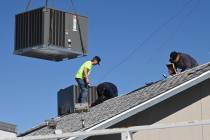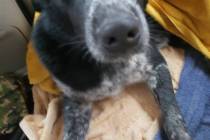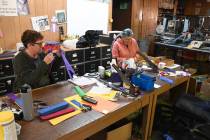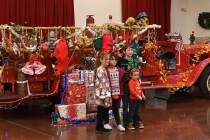Tithing and fraud an unsavory topic
This may not be a popular column topic, but it’s something that needs to be said. Please don’t shoot the messenger.
People — human beings in general — are prone to a multitude of belief systems. Many choose a religion and a church, others will opt for a church-like atmosphere that welcomes all comers, regardless of specific belief. There was a time when this type of congregating was entirely safe, however now, like so many things, care must be taken.
Nevada has the highest concentration of churches per capita in the U.S. In too many cases, the reality is that individuals will form a church as a tax haven — and our state is big on hiding money. The key may lie in the tax code, which reads in part, … “Every organization exempt from federal income tax under IRS 501(a) must file an annual information return except: 1) A church … “They are also exempt from filing an annual report. Transparency is therefore at a minimum, so like anything else you do with your time and your money, even church settings must be verified.
Why? Statistics, that’s why. In a study conducted by Todd M. Johnson, PhD, there was a growing concern about what is referred to as “Ecclesiastical Crime.” Essentially, it’s skimming or downright theft from churches, by insiders, and those are places that we have always thought of as safe.
Almost $600 billion is donated to churches (worldwide) per year and a staggering 6 percent, in the range of $37 billion, is diverted for private profit.
This number is just slightly higher than the $32 billion that is annually spent on mission work intended to introduce Christianity to more people around the globe. The numbers are frightening and projected to be growing every year.
My point in bringing up this touchy subject, one that many of us do not want to think about, is simply to illustrate that we live in a society in which nothing is sacred. I still believe that the vast majority of church organizations are indeed safe, but I also tend toward the belief that it’s entirely possible to have a large barrel of perfect fruit … except for that one rotten one deep inside.
In our world of have and have nots, where our population and the distribution of money among the masses is constantly changing, 100 percent safe places have ceased to exist. So just like you check out products before you buy them, business reputations before you become involved as a customer, and even healthcare providers before you fill out a new patient intake form — you need to add churches and similar affiliate organizations to the list of “check ‘em out first.”
Fraud is, especially given recent economic challenges, EVERYWHERE. And I do mean everywhere. Once again, apologies for even mentioning such a touchy subject. My intent is not to offend, but to protect.
Stay tuned for next week; I’ll try to be back on safe ground.
Drop by the Pahrump Valley Times offices, 2160 E. Calvada Blvd., for a copy of Leslie Kim’s latest book “123 Main Street … the Scamming of America.” Only $19.95 while supplies last.
















